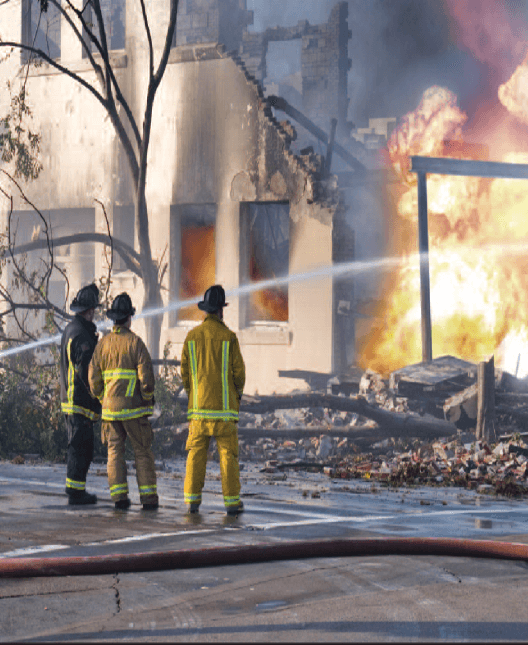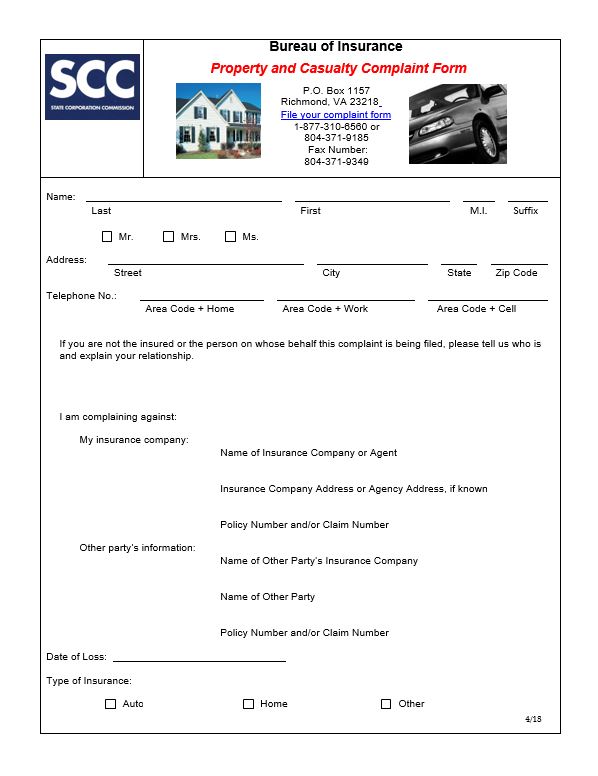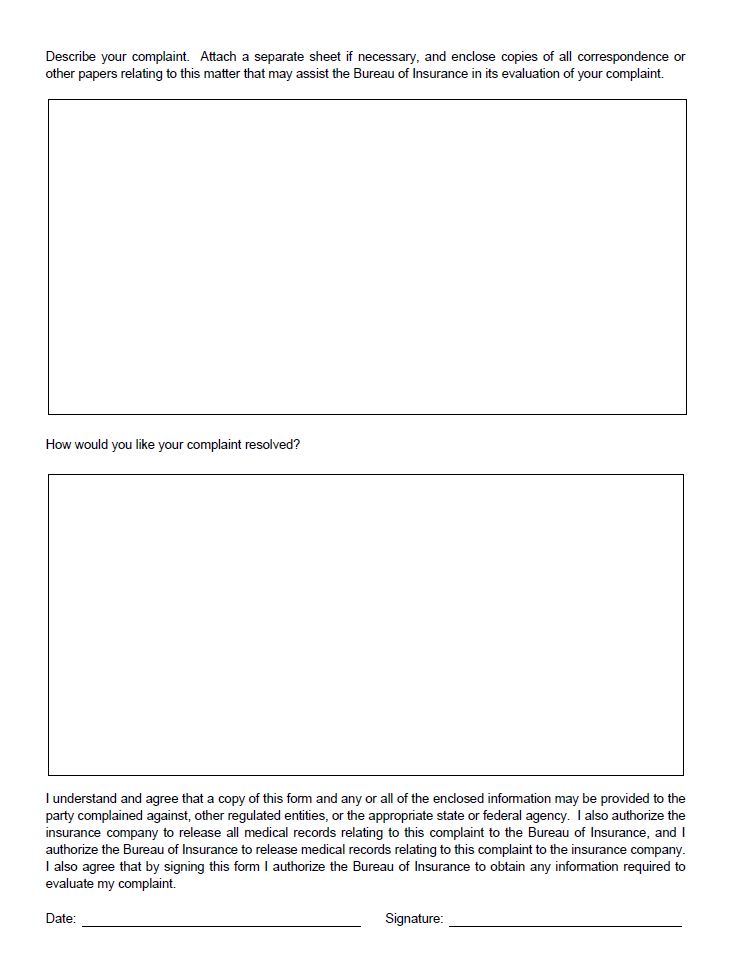When a Disaster Strikes:
What to Do After an Insured Commercial Property Loss
A Question and Answer Guide for Consumers

Prepared by
Commonwealth of Virginia
State Corporation Commission
Bureau of Insurance

This Consumer's Guide should be used for educational purposes only. It is not intended to be an opinion, legal or otherwise, of the State Corporation Commission on the availability of coverage under a specific insurance policy or contract, nor should it be construed as an endorsement of any product, service, person, or organization mentioned in this guide.
2018-2021
Commonwealth of Virginia
State Corporation Commission
P.O. Box 1157
Richmond, VA 23218
Bureau of Insurance Landing Page

How do I report a claim?
Your insurance agent is the first link between you and your company. If your agent is unavailable or if your insurance company does not have representatives on the scene available to help you, call the company directly, and ask for the claims department. The company's phone number is listed in your policy or can be obtained through the Bureau of Insurance. Please note the Bureau of Insurance does not have a record of your policy or policy number. Your insurer’s website may provide important information on how to report a claim.
It is very important that you fully understand your rights and responsibilities so that you can take charge of your own situation. If your insurance policy has been lost or destroyed in the disaster or if you are confused about the policy benefits or exclusions, your agent or company will be able to tell you exactly what coverages you have purchased.
What should I do if my company has not responded to my claim?
After you report your loss, the insurance company will assign a company representative to check the damage to your property and determine how much will be paid for your loss. If it is necessary to vacate your building, be sure to report the address and phone number where you can be reached.
Virginia has certain laws and regulations that govern the claims handling practices of your insurance company. For example, insurance companies are required to acknowledge the receipt of your claim within 10 working days. They also are required to provide you with the appropriate forms to file a claim. If your company has not responded to you within the required period of time or if you have experienced any other unreasonable delays in the handling of your claim, the Bureau of Insurance can provide assistance.
What information must I give to the company representative?
Your property insurance policy requires you to complete a claim report which lists all items destroyed, damaged, or missing. If you do not have or cannot locate a complete inventory, try to picture the contents of your building, and then list and describe all the items that were damaged or destroyed.
As accurately as possible, try to remember when or where you bought each item, how much you paid for it, and how much it will cost to replace it. It is also helpful to include the brand name and model number if you know it.
You may wish to prepare an inventory and/or photograph the building and its contents now, and store a copy in a safe place at a different location. This will make preparation of your claim much easier and more accurate.
What services can I expect from the company representative?
The representative may ask to examine all damaged items to prepare a written damage estimate for the company. You may ask for a copy of this report and should not hesitate to ask questions if you do not understand it or need help in completing the claim form.
Should I wait for the company's permission to begin clean-up?
To protect your property from further damage, you should make all necessary temporary repairs, such as boarding up windows and patching holes in walls or roofs, as soon as possible, even if you have not yet seen the company representative. You can also move your building contents to a protected area and begin cleaning and drying items damaged by water. However, you should not dispose of any items that you believe may be a complete loss until the company representative has examined them.
Take photographs to show how it looked before you started cleaning and repairing, and be sure to keep receipts for all of your clean-up expenses. Most property insurance policies cover the reasonable costs of emergency clean-up and temporary repairs.
Can I hire someone to make emergency repairs?
Probably. Most property insurance policies cover reasonable costs for materials and labor expenses for temporary and emergency repairs in addition to any final repairs made to your property. You should also ask your company representative how the company will compensate you for work you do yourself. Be sure to keep all of the receipts.
How should I go about choosing a contractor to make repairs?
When choosing a contractor, you should make sure that you deal only with established firms or individuals who can provide references and are willing to give you a signed contract. If friends or associates cannot recommend a reputable contractor, check with the local disaster center, your local building code department, or the Better Business Bureau for guidance.
Some insurance companies may have a list of qualified contractors that they can recommend, but it is ultimately your responsibility to select a contractor. You may also want to contact the Board of Contractors with the Department of Professional and Occupational Regulation to verify that the contractor is licensed and in good standing. The telephone number for the Department of Professional and Occupational Regulation is (804) 367-8500.
Obtain written estimates before repairs begin, and do not sign any contracts for major repair until the company representative has determined how much damage there is and how much the company will pay.
A contractor told me he can do the job faster if I just sign my check over to him. Is that a good idea?
No. If the repair work is extensive, the contractor may ask for periodic partial payments as the work progresses, but it is highly unlikely that a reputable contractor would request full payment in advance. The contract should specify that payments will be made as the work is completed. If you have a mortgage on your building, the lending institution may also have specific requirements as to how the insurance funds are disbursed.
What if my contractor says the repairs will cost a lot more than the company representative has allowed?
If there is a discrepancy over the cost of repairs or the contractor has found hidden damage, you should first contact the company representative to try to resolve the difference. If you are still unable to resolve your differences, contact the Bureau of Insurance.
My building suffered heavy structural damage. The company representative says it's repairable, but the contractor and I disagree.
If your contractor believes that the building is unsafe and not repairable, you may ask your contractor to provide documentation that can be given to the insurance company supporting this position. You may also wish to contact your local building code department inspector regarding the safety and occupancy of the building. If the building inspector determines that the structural damage is extensive and not safe to repair, ask the inspector to provide supporting documentation that you can provide to the insurance company. Typically, the company representative will contact the building inspector if more information is needed to arrive at a decision.
How much will the company pay to repair/rebuild my building?
That depends on the type of policy you purchased. If your policy pays actual cash value, the company will pay the reasonable cost to repair or rebuild your building minus depreciation. Companies use many different factors to determine how much to deduct for depreciation, but with an actual cash value policy, you should not expect to be reimbursed for the full amount of repairs.
If you have purchased a replacement cost policy and have met the company's "insurance to value" requirements, the company will first pay you the actual cash value (ACV) as described above. You have six months from the date of the last ACV payment to make a claim for the difference between the ACV and the replacement cost of the building. Once the actual repair or rebuilding is completed, the company will then pay you the difference up to the policy limits. If you choose not to repair or rebuild, the company is obligated to pay you only the actual cash value. Many policies require you to rebuild at the same location, but you may be able to negotiate this requirement with the company representative.
I was prevented from entering my building for several days, and I discovered mold when I gained access to the building. What should I do?
If you discover mold while attempting to clean and dry items damaged by water, contact the company representative immediately for additional assistance.
Will my policy cover the costs of meeting local/state building codes and ordinances when I repair or rebuild?
First, check with your agent to determine whether your policy includes coverage that will pay for these expenses. Although some policies provide a limited amount of coverage, with exclusions, for no additional charge, Virginia law requires insurers to offer the option of purchasing broader “ordinance or law” coverage. Your agent or insurance company will be able to explain the coverage provided in your policy.
If your policy does not cover these costs or if you did not buy the additional coverage, check with the federal agencies at the local disaster center to see if you are eligible for any financial assistance.
What should I do if I have an insurance question or problem?
-
Contact your agent or company.
If you believe your insurance company has improperly canceled or nonrenewed your policy, has increased your premium over 25%, or has refused to pay all or part of a valid claim, you have the right to question this. Sometimes a mistake has been made, and it will be corrected if an inquiry is made. A complaint by letter is best. Keep a copy of your letter. If you decide to contact the agent or company by telephone, keep a written record of:
The date and time of your call.
The name of the person you talked to.
What was said during the call.
-
Seek help from the Bureau of Insurance.
If you do not receive a prompt and satisfactory response, you may need to get help to resolve your problem.
The State Corporation Commission Bureau of Insurance provides free professional information and complaint services to all Virginia residents.
To use these services, you can:
Call (804) 371-9185 if you live in Richmond.
Call toll-free (877) 310-6560
Fax (804) 371-9349
Call (804) 371-9206 for Telecommunications Device for the Deaf
Review the Bureau's Website: Bureau of Insurance Landing Page
-
If you want to email us with a general question, please contact us at: BureauOfInsurance@scc.virginia.gov
-
Visit the Bureau of Insurance
Tyler Building, 5th Floor
1300 East Main Street
Richmond, Virginia -
Use the complaint form at the bottom of this page or fill in and print this one and mail it to:
State Corporation Commission
Bureau of Insurance
P.O. Box 1157
Richmond, Virginia 23218
The Bureau of Insurance will:
Thoroughly investigate your complaint;
See that you get a clear response to your questions;
Cut through the red tape; and
Correct misunderstandings.
But the Bureau cannot:
Force a favorable action on your complaint.
Provide legal services that are sometimes required to settle complicated problems.
If the Bureau is unable to resolve your problem, we will tell you why. If the law and facts are on your side, we will try to see that your rights are protected and that your complaint is resolved in a satisfactory manner.
Complaint Form

